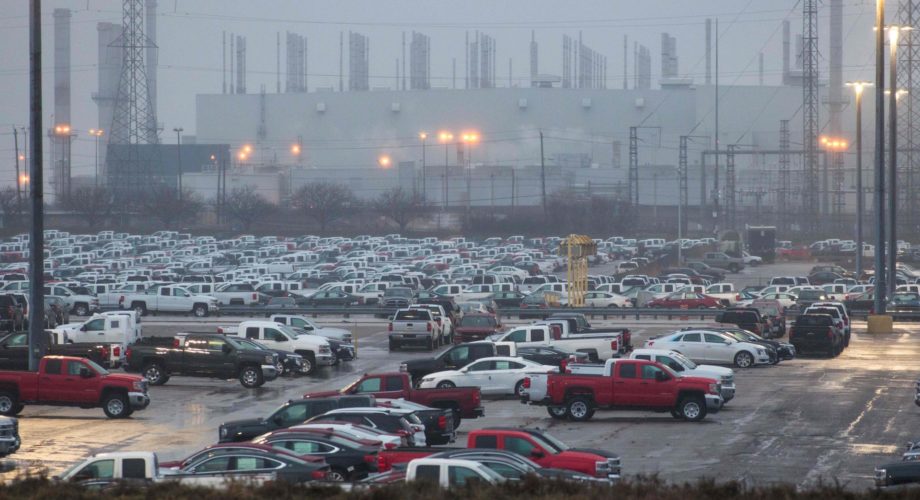
Hundreds of General Motor vehicles are parked outside the GM assembly plant in Oshawa, Ontario, on Monday.
General Motors has announced it will halt production at five North American facilities and cut 14,700 jobs as it deals with slowing sedan sales and the impact of Donald Trump’s tariffs.
More than 6,000 blue-collar jobs will be hit by GM plans to stop production at a car plant in Canada and two more in Ohio and Michigan. Two transmission plants in the US will also be mothballed, putting the future of those plants in doubt.
The cuts will also include 15% of GM’s 54,000 white-collar workforce, about 8,100 people, and come as 18,000 GM workers have been asked to accept voluntary redundancy.
The move will also significantly reduce car production in North America as GM moves to stop building some low-selling car models.
“We are taking this action now while the company and the economy are strong to keep ahead of changing market conditions,” Mary Barra, GM’s chief executive, said in a conference call.
The car plants – Lordstown Assembly in Ohio, Detroit-Hamtramck Assembly and Oshawa Assembly – all build slow-selling cars. Trump held a rally close to the Lordstown plant in July and told workers not to sell their homes because “jobs are coming back.”
The issue will be addressed in talks with the United Auto Workers union next year. Barra made calls early on Monday to disclose the plans, the sources said.
Cost pressures on GM and other car companies and suppliers have increased as demand has waned for traditional sedans. The company has also said tariffs on imported steel, imposed earlier this year by the Trump administration, have cost it $1bn.
Michelle Krebs, an executive analyst at Autotrader, said Barra was “trying to get ahead of a potential crisis by making cuts now”. She said a confluence of factors had triggered GM’s actions: a downturn in the important China market and a potential downturn in the North American market; the dramatic shift by consumers from traditional cars to utility vehicles; and the impact of tariffs and trade issues.
GM is poised to idle an assembly plant in Canada. A Canadian union, Unifor, which represents most unionized autoworkers in Canada, said on Sunday it had been informed by GM that there would be no product allocated to the plant in Oshawa after December 2019.
Justin Trudeau, Canada’s prime minister, expressed his “deep disappointment” with the decision. He said on Twitter: “GM workers have been part of the heart and soul of Oshawa for generations – and we’ll do everything we can to help the families affected by this news get back on their feet. Yesterday, I spoke with GM’s Mary Barra to express my deep disappointment in the closure.”
America’s largest car maker employs about 2,500 union staff in Oshawa, which produces the Chevrolet Impala and Cadillac XTS sedans. It also completes final assembly of the stronger-selling Silverado and Sierra pickup trucks, shipped from Indiana.
GM has internally debated for months how to address shrinking car demand, a person briefed on the matter said, and the issue is certain to re-emerge when GM holds contract talks next year with the UAW.
The company has begun what is expected to be a long and expensive transition to a new transportation model that embraces electrified and automated vehicles, many of which will be shared rather than owned. GM signaled the latest belt-tightening in late October when it offered buyouts to 50,000 salaried employees in North America.
Lagging US car sales has seen several car plants fall to just one shift, including its Detroit Hamtramck Assembly plant and Lordstown, Ohio, assembly plant.
Rivals Ford and Fiat Chrysler have curtailed US car production. Ford said in April it planned to stop building nearly all cars in North America.
An industry-wide slowdown in passenger car sales started to pick up in 2017. The shift in US consumer preference away from passenger cars in favor of larger, more comfortable SUVs and pickup trucks has been swift and severe, leaving automakers scrambling to readjust.